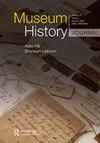An aspect of the object habit: Pliny the Elder, audience and politics
IF 0.1
Q3 HISTORY
引用次数: 0
Abstract
ABSTRACT This paper looks at an aspect of the ‘object habit’ by considering the motivations behind an ancient technical text, Pliny the Elder’s Natural History. The text is an ‘encyclopaedia’ of knowledge covering a vast range of subjects and approaches by studying objects including things found in nature and worked by man. For Pliny, these phenomena shared enough to be considered together while presenting an inventory of the resources in the Roman world and thus controlled by the emperor Titus (AD 79–81), to whom the work is addressed. The collection of knowledge for Pliny is a political act. The Natural History’s collapse of distinctions between objects, animate or inanimate, worked by man or in a natural state, as well as its insistence on political motivations for collecting objects and knowledge, serve as starting place for considering the ‘object habit’ and the impact of politics on collecting. Two examples are discussed: a Benin ‘bronze’ at a Cambridge college, and three giraffes gifted to the superpowers of nineteenth-century Europe.对象习惯的一个方面:老普林尼、观众和政治
摘要本文着眼于“客体习惯”的一个方面,通过思考古代技术文本《老普林尼自然史》背后的动机。该文本是一本知识的“百科全书”,涵盖了广泛的主题和方法,通过研究物体,包括自然界中发现的和人类创造的东西。对普林尼来说,这些现象足够共同,可以一起考虑,同时提供了罗马世界的资源清单,因此由皇帝提图斯(公元79-81年)控制,这项工作就是针对提图斯的。为普林尼收集知识是一种政治行为。《自然史》对人类或自然状态下的有生命或无生命物体之间区别的瓦解,以及对收集物体和知识的政治动机的坚持,是考虑“物体习惯”和政治对收集的影响的起点。讨论了两个例子:一个是剑桥大学的贝宁“青铜”,三只长颈鹿被赠送给19世纪欧洲的超级大国。
本文章由计算机程序翻译,如有差异,请以英文原文为准。
求助全文
约1分钟内获得全文
求助全文
文献相关原料
| 公司名称 | 产品信息 | 采购帮参考价格 |
|---|

 求助内容:
求助内容: 应助结果提醒方式:
应助结果提醒方式:


